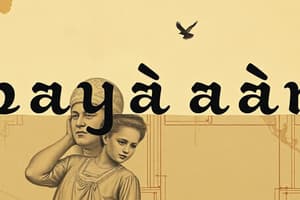Podcast
Questions and Answers
Pre-colonial literature is mostly about daily experiences.
Pre-colonial literature is mostly about daily experiences.
False
Pre-colonial literature no longer exists in the 21st century.
Pre-colonial literature no longer exists in the 21st century.
False
Pre-colonial literature consists of both oral and written forms.
Pre-colonial literature consists of both oral and written forms.
True
The literary theme often present in pre-colonial literature is Christian faith.
The literary theme often present in pre-colonial literature is Christian faith.
Signup and view all the answers
One type of pre-colonial literature that is still prevalent today is the chant.
One type of pre-colonial literature that is still prevalent today is the chant.
Signup and view all the answers
Pre-colonial literature is of low quality.
Pre-colonial literature is of low quality.
Signup and view all the answers
Fables discuss the occurrence on earth and how things were created.
Fables discuss the occurrence on earth and how things were created.
Signup and view all the answers
Epic is a type of pre-colonial literature that discusses how things were created on earth.
Epic is a type of pre-colonial literature that discusses how things were created on earth.
Signup and view all the answers
Comparing 21st century literary genres to earlier periods includes elements, structures, and traditions.
Comparing 21st century literary genres to earlier periods includes elements, structures, and traditions.
Signup and view all the answers
Oral history research with a focus on key personalities from the students' region is part of the requirements for understanding Philippine literary history.
Oral history research with a focus on key personalities from the students' region is part of the requirements for understanding Philippine literary history.
Signup and view all the answers
Study Notes
Pre-Colonial Literature in the Philippines
- The pre-colonial period lacked a formal system of writing, leading to a rich tradition of oral literature.
- Few written records survive, which is why no notable authors from this era are recognized.
- Events during pre-colonial times in the Philippines began being recorded after 1521.
- Oral traditions included folk speeches, folk songs, narratives, indigenous rituals, and dances, linking Filipinos to Southeast Asian cultures.
Government and Education
- Filipinos were governed by chieftains leading various barangays, focusing on alliance networking rather than territorial control.
- Formal education was absent; learning occurred through imitation and practical experience.
Continuity of Pre-Colonial Literature
- Certain types of pre-colonial literature, such as folk songs and proverbs, remain prevalent today.
- Common themes in pre-colonial literature often revolve around nature, daily experiences, and cultural practices.
Forms of Pre-Colonial Literature
- Pre-colonial literature can be categorized into three main groups:
- Folk Speech: Includes riddles and proverbs.
- Folk Songs: Reflects traditions and daily life.
- Folk Narratives: Comprises myths, legends, fables, and hero tales.
Cultural Significance
- The discovery of artifacts, such as those from the Tabon Cave, highlights the long history of indigenous cultures in the Philippines, dating back approximately 50,000 years.
- Analysis of collected oral literature helps to preserve and understand the rich cultural heritage before Spanish colonization.
Quiz Insights
- Common literary forms: Chant, Kundiman, Proverbs, and folklore.
- Literature themes include nature and daily life experiences.
- Literary discussions often cover myths regarding the earth's creation.
- Pre-colonial literature includes both oral and written forms and holds cultural significance despite misconceptions about its quality and existence today.
Studying That Suits You
Use AI to generate personalized quizzes and flashcards to suit your learning preferences.
Description
Test your knowledge on Philippine pre-colonial writing systems and the impact of 21st century technology on entertainment and communication. Explore the evolution of written and oral literature in the Philippines through this quiz.




